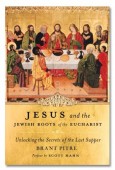Grazing on “Jesus and the Jewish Roots of the Eucharist” – Foreword
Me vida commented the other day that I am a gluttonous reader.
She’s right.
Most of the time I read greedily. I shovel down page after page with hardly a pause, as if fearful that Adam will drink the last Miller Light, or Samuel will snag the last slice of pizza. Some books (e.g. The Stainless Steel Rat) deserve to be enjoyed this way. Others should be savored, pausing frequently to consider the interplay of scents, flavors, and lingering tones. The art of reading well is to know the author, genre, and style well enough to enjoy each book appropriately. It would be just as wrong to attempt to savor a can of Miller Light as to chug a malt glass of Laphroaig 30 Cask Strength.
An old gospel preacher once commented that we are indeed sheep: we trample more green pasture (Psalm 23) than we ever graze . I picked up Dr. Brant Pitre‘s excellent Jesus and the Jewish Roots of the Eucharist this morning, and decided to re-read it grazingly instead of gluttonously. Rather than speed-read my way through, eager to move on to the next in my enormous backlog of books, I’m going to force myself to stop when something strikes me, meditate upon it, then consider whether I should continue reading immediately, or set it aside to allow time to savor the goodness.
I made it to page x of the foreword.
Scott Hahn writes in the foreword that “Love transforms suffering into sacrifice.”
He goes on to say
Saint Paul preached: “I appeal to you therefore, brethren, by the mercies of God, to present your bodies as a living sacrifice, holy and acceptable to God, which is your spiritual worship” (Romans 12:1). Note that he speaks of “bodies” in the plural, but “sacrifice” in the singular. For we are many, but our sacrifice is one with Jesus’ own, which is once for all. (Heb 7:27, 912, 9:26, 10:10)
Love transforms suffering into sacrifice.
- Discovery – David Clayton, artist and lecturer at Thomas More College of Liberal Arts
- Why is the Finding in the Temple Joyful?

